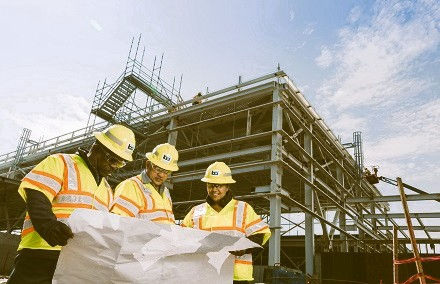Strategies for Securing Government Contracts
- Eldon Riley

- Aug 25, 2025
- 9 min read
Navigating the world of construction can be like solving a complex puzzle. You’ve got a vision for your project, but when it comes to making it a reality, you’re faced with crucial decisions.
One of the most important is choosing between a general contractor and a subcontractor. Understanding the difference can save you time, money, and a lot of headaches. Imagine having the power to streamline your project, avoid unnecessary delays, and ensure top-notch quality.
You’ll discover what sets these roles apart and how each can impact your project. By the end, you’ll be equipped with the insights to make informed decisions, unlocking the potential for a seamless construction experience. Get ready to demystify these key players and gain the confidence to drive your project to success.

Roles And Responsibilities
Understanding the roles and responsibilities of general contractors and subcontractors is crucial in construction. Each plays a unique part in the project's success. Knowing their duties helps maintain a smooth workflow and ensures timely completion.
Project Management
General contractors handle the overall project management. They plan, execute, and oversee the entire construction process. Their responsibilities include budgeting, scheduling, and ensuring compliance with regulations. They serve as the main point of contact for clients and stakeholders. Communication with all parties is part of their daily tasks. General contractors coordinate with subcontractors to ensure project timelines are met.
Subcontractors focus on specific tasks within the project scope. They do not manage the entire project. Instead, they report to the general contractor. Subcontractors are responsible for their own team and deliverables. They provide expertise in their specialized field.
Specialized Tasks
Subcontractors bring specialized skills to the construction site. They may work on electrical, plumbing, or carpentry tasks. Each subcontractor is an expert in their trade. They ensure their work meets quality standards and specifications. Their focus is on delivering precise and efficient service.
General contractors rely on subcontractors for these specialized tasks. They ensure the right subcontractors are hired for each job. This collaboration allows for successful project completion. The general contractor oversees the integration of these specialized tasks into the broader project.
Skill Sets Required
The construction industry relies heavily on both general contractors and subcontractors. Each plays a unique role in successful project completion. Understanding the skill sets required for both is essential. It helps determine the right fit for specific tasks and ensures smooth operations.
Leadership And Coordination
General contractors need strong leadership skills. They oversee the entire project. This involves managing timelines and budgets. Coordination is crucial to handle multiple tasks simultaneously. Effective communication helps in directing teams and resolving conflicts.
Subcontractors also require coordination skills. They focus on specific tasks within the project. Managing their team efficiently ensures tasks are completed on time. Good coordination with general contractors is essential for project harmony.
Technical Expertise
Technical expertise is vital for both roles. General contractors must understand various construction processes. This includes knowledge of building codes and regulations. They ensure all work meets industry standards.
Subcontractors specialize in particular trades. Their expertise lies in areas like plumbing or electrical work. Precision and skill are necessary to execute tasks accurately. This expertise guarantees quality and safety in specific project areas.

Legal And Financial Considerations
Choosing between a general contractor and a subcontractor involves key legal and financial decisions. General contractors handle project management and contracts, often requiring more liability and insurance. Subcontractors focus on specific tasks, with distinct contractual agreements, impacting financial obligations. Understanding these differences aids in making informed choices.
When you're diving into the world of construction, understanding the legal and financial considerations between a general contractor and a subcontractor is crucial. These roles are distinct, each with its own set of responsibilities and risks. Knowing the differences can save you from potential headaches and financial pitfalls.
Contractual Obligations
General contractors typically enter into a direct contract with the client, which means they are responsible for overseeing the entire project. This includes ensuring the work is completed on time, within budget, and to the client's satisfaction.
On the other hand, subcontractors sign contracts with the general contractor and are responsible for specific tasks like plumbing or electrical work. Have you ever wondered who holds more risk? General contractors bear the overall project risk, while subcontractors face risks related to their specific scope of work. If a subcontractor fails to deliver, the general contractor remains accountable to the client.
Payment Structures
Payment can vary significantly between general contractors and subcontractors. General contractors often receive payments in installments based on project milestones. This ensures they have the cash flow to pay their subcontractors and cover other expenses.
Subcontractors, however, usually receive payment once their portion of the work is completed and approved. This can create cash flow challenges, especially if the approval process is delayed. Have you considered how this affects your budgeting and financial planning? Understanding these financial dynamics is key. For example, if you're a subcontractor, you might need to negotiate payment terms that align better with your cash flow needs.
On the flip side, if you're a general contractor, ensuring timely payments from clients can help keep your team motivated and the project on track. Legal and financial aspects in construction aren't just formalities—they're the backbone of a successful project. By being informed, you can navigate your role more effectively and avoid common pitfalls.
Hiring And Selection Process
The hiring and selection process is crucial for any construction project. A good team ensures timely completion and quality work. This process involves choosing a general contractor and selecting subcontractors. Each role is vital to the project's success. Let's explore how to make these important decisions.
Choosing A General Contractor
Selecting the right general contractor is the first step. Start by checking their experience and reputation. Ask for references from previous clients. This provides insight into their reliability and work quality. It's important to review their past projects.
This helps assess their ability to handle your specific needs. Ensure they have the necessary licenses and insurance. This protects you from potential liabilities. Finally, trust your instincts. A contractor with good communication skills is crucial. They will keep you updated throughout the project.
Selecting Subcontractors
The selection of subcontractors requires careful consideration. Begin by identifying the specific skills needed. This ensures you hire experts in their field. Request bids from several subcontractors. This helps compare costs and services.
Review their past work and client feedback. It's essential to verify their credentials and certifications. This guarantees they meet industry standards. Communication is key here, too. Choose subcontractors who are responsive and cooperative. They should work well with the general contractor and other team members.

Project Workflow
A project workflow involves both general contractors and subcontractors. General contractors oversee the entire project, ensuring all tasks align. Subcontractors focus on specialized tasks, bringing expertise to specific areas. Together, they ensure projects run smoothly and efficiently.
Navigating the world of construction can often feel like assembling a complex puzzle. Understanding the distinct roles of a general contractor and a subcontractor is crucial to ensuring a smooth project workflow. Each plays a vital role in bringing your construction dreams to life. But how do their responsibilities differ, and what does this mean for the workflow of your project? Let's dig into the details.
Overall Planning
In the realm of construction, effective overall planning is the backbone of a successful project. The general contractor is your go-to person here. They map out the entire project from start to finish, creating a comprehensive plan that outlines timelines, budgets, and resource allocation.
This involves coordinating with architects, engineers, and other stakeholders to ensure every element aligns with your vision. Have you ever wondered how a construction site stays organized amidst all the chaos? It’s the meticulous planning by the general contractor that keeps everything on track.
Execution Of Specific Tasks
Once the plan is set, it's time to roll up the sleeves and get things done. This is where subcontractors come into play. They are specialists brought on board to execute specific tasks like electrical work, plumbing, or painting. Imagine a symphony orchestra where each musician plays a unique instrument.
Subcontractors are like those musicians, each bringing their expertise to the table. They follow the general contractor's plan but focus on their specific tasks to ensure quality and efficiency. Are you prepared to manage these experts, or would it be better to leave it to a general contractor? Consider your level of expertise and involvement desired in the project. The choice can significantly impact the efficiency and success of your construction project.
Communication And Collaboration
General contractors and subcontractors must work together effectively for project success. Clear communication ensures tasks are understood. Collaboration helps streamline processes and resolves issues quickly.
Effective communication and seamless collaboration are crucial when working with general contractors and subcontractors. These two roles must work in harmony to ensure a project's success. Each plays a unique part, requiring constant coordination and resolution of any conflicts that may arise.
Coordinating Efforts
General contractors act as the primary point of contact. They coordinate efforts between the client and various subcontractors. This role requires clear communication to align everyone on project timelines and expectations. Subcontractors, on the other hand, focus on their specialized tasks. They must stay updated on the project's overall progress.
Good communication with the general contractor ensures that their work fits seamlessly into the larger picture. Imagine a time when a slight delay in material delivery threw your project off track. If the general contractor and subcontractors communicate effectively, they can adjust schedules and minimize impact. How do you ensure everyone stays on the same page? Regular meetings and updates can help keep the team aligned.
Resolving Conflicts
Conflicts can arise from misunderstandings or differing priorities. General contractors need to address these issues quickly to avoid project delays. They mediate discussions to find solutions that satisfy all parties involved. Subcontractors should voice concerns promptly. Open communication allows potential conflicts to be resolved before they escalate. This proactive approach fosters a positive work environment.
Think about a scenario where two subcontractors have overlapping tasks. How would you handle it? Clear communication helps in defining responsibilities and avoiding duplication of work. When conflicts are resolved efficiently, it builds trust and strengthens the working relationship. This collaborative spirit is essential for the successful completion of any project.

Challenges And Solutions
Being a general contractor or subcontractor is no walk in the park. Both roles come with their unique set of challenges and solutions. Whether you’re managing a team or focusing on specialized tasks, you face hurdles that can impact your project’s success. Let's explore some common issues and effective strategies to tackle them head-on.
Common Issues
Communication breakdown is a frequent problem. Imagine trying to juggle multiple projects with unclear instructions. Miscommunication leads to delays and costly mistakes.
Payment disputes can also arise. You complete your work, but a payment hiccup stalls progress. This can strain relationships and affect cash flow.
Scheduling conflicts are another headache. You plan meticulously, only to find out subcontractors are double-booked or unavailable. This disrupts timelines and affects the project's momentum.
Effective Strategies
Enhance communication by setting clear expectations. Use project management tools to track progress and foster transparency. Regular meetings ensure everyone is on the same page.
Address payment issues upfront. Draft clear contracts that outline payment terms. If disputes arise, mediation can be a valuable tool to find a fair resolution.
Improve scheduling with a shared calendar. Encourage subcontractors to update availability and any conflicts promptly. This proactive approach minimizes disruptions and keeps your project on track.
Ever faced a challenge that seemed insurmountable? Reflect on how you overcame it. These experiences offer valuable lessons. How might your solutions apply to current problems?
Whether you're a general contractor or subcontractor, understanding these challenges and solutions can empower you to lead successful projects. Armed with effective strategies, you can navigate complexities with confidence. What will you do differently next time?
Frequently Asked Questions
What Is The Difference Between A Subcontractor And A General Contractor?
A general contractor oversees the entire construction project and coordinates various tasks. A subcontractor specializes in specific tasks within the project, working under the general contractor's guidance. The general contractor manages project timelines and budgets, while subcontractors focus on executing their specialized work.
Both play essential roles in successful project completion.
Who Makes More, General Contractor Or Subcontractor?
General contractors usually earn more than subcontractors. They manage projects and oversee subcontractors, often charging a percentage of total project costs. Subcontractors earn based on specific tasks or trades they perform. Income can vary significantly based on experience, location, and project size.
What Is The Difference Between A Contractor And A Sub Contractor?
A contractor manages a project and hires others to complete tasks. A subcontractor is hired by the contractor to perform specific duties within the project. Both roles are crucial for successful project completion. Contractors oversee overall execution, while subcontractors focus on specialized work areas.
What Is The Difference Between A Primary Contractor And A Subcontractor?
A primary contractor is hired directly by the client to oversee a project. A subcontractor is hired by the primary contractor to complete specific tasks. The primary contractor manages the entire project, while subcontractors focus on specialized areas. Both play crucial roles in successful project completion.
Conclusion
Choosing between a general contractor and a subcontractor depends on your needs. General contractors handle the whole project. They coordinate and manage everything. Subcontractors focus on specific tasks, like plumbing or electrical work. Each plays a key role in construction projects.
Think about your project's size and complexity. This helps decide the best option for you. Clear communication ensures success and avoids misunderstandings. Make sure to research and ask questions. Understanding their roles leads to smoother projects. Always choose professionals you trust.
Your project's quality and timeline depend on it.
Ready to bring your home improvement dreams to life?
At MidCity Handyman & Remodeling, we specialize in turning visions into reality with quality craftsmanship and personalized service. Whether you're planning a remodel, repair, or upgrade, our team is here to make it happen.
Contact Us for a Free, No-Obligation Quote:
Website: midcityhr.com
Email: info@midcityhr.com
Phone: (585) 283-0160
Facebook: facebook.com/MidCityHR
Follow us on Facebook for updates on our latest projects and helpful tips. Let’s make your home everything you’ve dreamed of!



